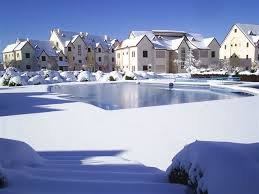Ifrane is located in the province of Ifrane, a mountainous Amazigh city of ancient Moroccan cities. It is characterized by its relatively cold weather, with snow covering its mountain slopes in both autumn and winter. Its atmosphere is characterized by moderation during the spring The summer is also filled with waterfalls that attract visitors to this city. This is probably the name of the city of Oranges, which means the orchard. In Arabic, it was known as the garden. This area was named after Switzerland. Small, due to the European character that characterizes it.
The modern town of Ifrane was established by the French administration in 1928 during the protectorate era for their administration due to its Alpine climate. Ifrane was conceived as a “hill station” or colonial type of settlement. It is a resort town set high up in the mountains so that Europeans can find relief from the summer heat of tropical colonies. Ifrane is also a popular altitude training destination.
The first permanent settlement of the area dates to the 16th century, when the Sharif of Sîdî 'Abd al-Salâm established his community in the Tizguit Valley, seven km downstream from the present town. Ifrane is a colonial “hill station”, and a “garden city”. It is also an “imperial city”, a mountain resort, a provincial administrative center, and a college town.
Because of its elevation, the town experiences snow during the winter months and a cool climate during the summer.[7]
Located in the Atlas Mountains, and affected by the cold north Atlantic current, Ifrane has an oceanic climate with continental influence, or a warm-summer Mediterranean climate in the Köppen climate classification. The climate shifts from cold in winter to warm days in the summer months. The nights can be severely cold in winter. Although it usually drops below freezing point, the "real feel" is usually -9/10 lower than the real temperature. The winter highs rarely exceed 10 °C (50.0 °F) in December–February.
Owing to the city’s elevation and proximity to the north Atlantic Ocean, rainfall is very heavy whenever frontal systems affect the region. Precipitation patterns follow the classic Mediterranean range, from October to April. The city also receives high snowfall starting as early as October and lasting well into spring season. The annual average temperature does not exceed 11 °C.
Hi! I am a robot. I just upvoted you! I found similar content that readers might be interested in:
https://broom02.revolvy.com/topic/Ifrane,%20Morocco&item_type=topic